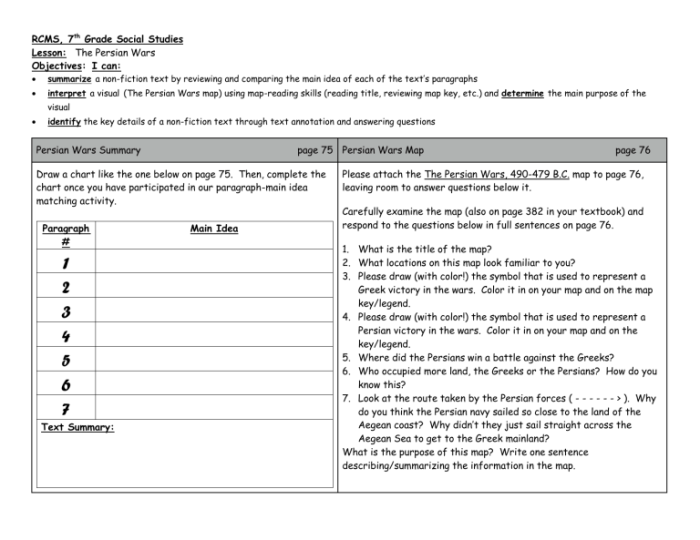The persian wars worksheet answer key pdf – Embark on an enlightening journey with our comprehensive Persian Wars Worksheet Answer Key PDF. This meticulously crafted guide unveils the significance, causes, key players, impact, and educational resources surrounding this pivotal conflict that shaped the ancient world.
Delve into the historical overview, exploring the timeline of key events and the major battles that defined the Persian Wars. Understand the underlying causes that ignited the conflict between Persia and Greece, considering territorial expansion, economic factors, and cultural differences.
The Persian Wars: The Persian Wars Worksheet Answer Key Pdf

The Persian Wars were a series of conflicts between the Persian Empire and the Greek city-states from 499 to 449 BC. The wars had a profound impact on the history of both Persia and Greece, and their legacy continues to shape the world today.
Historical Overview
The Persian Wars began with the Ionian Revolt, a rebellion by Greek cities in Asia Minor against Persian rule. The revolt was supported by Athens and Eretria, two Greek city-states on the mainland. The Persians responded by sending a massive army and navy to crush the revolt.
The Ionian Revolt was eventually defeated, but it marked the beginning of a long and bloody conflict between Persia and Greece.
The Persian Wars continued with a series of invasions of Greece by the Persian Empire. The first invasion, led by King Darius I, was defeated at the Battle of Marathon in 490 BC. The second invasion, led by King Xerxes I, was more successful, and the Persians managed to capture Athens and much of Greece.
However, the Greeks were able to defeat the Persians at the Battle of Salamis in 480 BC, and the Persians were forced to retreat.
The Persian Wars ended with the Peace of Callias in 449 BC. The treaty recognized the independence of the Greek city-states and established a boundary between Persia and Greece.
Causes of the Persian Wars
The Persian Wars were caused by a number of factors, including territorial expansion, economic factors, and cultural and ideological differences.
Territorial expansion: The Persian Empire was a vast and ambitious empire, and it was constantly seeking to expand its territory. The Greeks, on the other hand, were a small and independent people who were determined to defend their homeland.
Economic factors: The Persian Empire was a wealthy and powerful empire, and it was able to use its resources to finance its wars. The Greeks, on the other hand, were a relatively poor people, and they had to rely on their own ingenuity and determination to defend themselves.
Cultural and ideological differences: The Persians and the Greeks had very different cultures and ideologies. The Persians were a centralized empire, ruled by a single king. The Greeks, on the other hand, were a decentralized society, made up of independent city-states. The Persians believed in the divine right of kings, while the Greeks believed in democracy.
Key Players and Strategies, The persian wars worksheet answer key pdf
The Persian Wars were fought by a number of key players, including:
- King Darius I: The Persian king who led the first invasion of Greece.
- King Xerxes I: The Persian king who led the second invasion of Greece.
- Themistocles: The Athenian general who led the Greek victory at the Battle of Salamis.
- Leonidas I: The Spartan king who led the Greek defense at the Battle of Thermopylae.
The Persians and the Greeks used very different military strategies. The Persians relied on their vast numbers and their superior cavalry. The Greeks, on the other hand, relied on their superior infantry and their ability to fight in close formation.
Impact and Legacy
The Persian Wars had a profound impact on the history of both Persia and Greece.
For Persia, the wars were a major setback. The Persians were defeated by a much smaller and weaker enemy, and their empire was never able to recover its former glory.
For Greece, the wars were a major victory. The Greeks were able to defend their independence and their way of life. The wars also helped to unify the Greek city-states and to lay the foundation for the development of Greek democracy.
The legacy of the Persian Wars continues to shape the world today. The wars are often seen as a symbol of the triumph of democracy over tyranny. The wars also helped to define the relationship between East and West, and they continue to be a source of inspiration for people all over the world.
FAQ Resource
What are the key events of the Persian Wars?
The key events include the Battle of Marathon (490 BCE), the Battle of Thermopylae (480 BCE), the Battle of Salamis (480 BCE), and the Battle of Plataea (479 BCE).
Who were the major leaders involved in the Persian Wars?
The major leaders involved were King Darius I of Persia and King Leonidas I of Sparta.
What were the long-term consequences of the Persian Wars?
The long-term consequences included the rise of Athens as a dominant power in Greece, the development of the Delian League, and the beginning of the Peloponnesian War.
